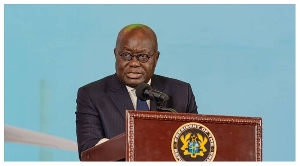Business News of Monday, 30 April 2012
Source: GNA
Ghana to mark International Workers day
Ghanaian Workers led by the Trades Union Congress in collaboration with Government are set to join the international community to commemorate May Day 2012 at Sunyani in the Brong Ahafo Region.
This year's celebration comes with the theme, "Election 2012: The role of workers in ensuring peaceful and fair elections".
The day would be used to take stock of the contribution of labour to the socio-politico-economic development of the world in general and Ghana in particular.
May Day or Labour Day has its origins in America when the Federation of Organised Trades and Labour Unions in 1884 started agitating against harsh working conditions.
Working hours were severe and it was quite common to work 10 to 16 hours a day in unsafe conditions. Death and injury were common at many work places and inspired the writing of books such as Upton Sinclair's "The Jungle" and Jack London's "The Iron Heel".
As early as the 1860's, working people agitated to shorten the work day without a cut in pay, but it wasn't fruitful until the late 1880's that organized labour was able to garner enough strength to declare the eight-hour work day.
This proclamation was without the consent of employers, yet demanded by many of the working class.
At its national convention in Chicago held in 1884, the Federation of Organized Trades and Labour Unions (FOTLU) which later became the American Federation of Labour, proclaimed that "eight hours shall constitute a legal day's labour from and after May 1, 1886".
The Federation in 1884 passed a resolution at their meeting that all legal ways for their demand to reduce the working hours from 16 hours to eight hours had failed and, therefore, decided to go on strike.
The movement gained momentum and on May 1, 1886, and a strike call was given. The centre of this movement was Chicago. To foil the strike, additional Police were hired and paid money by Industrialists.
For two days the strike remained peaceful. On May 3, near the McCormick Harvesting Machine Co. factory, Police resorted to unprovoked firing upon unarmed and peaceful demonstrators during which four labourers died and many others injured.
The next day on May 4 the organisers announced a big rally against the criminal action of the Police at the local market square. The gathering was peaceful. When the last leader was delivering his speech, the Police started firing on labourers and many of them died and hundreds were injured.
The Police made an excuse that someone from the gathering hurled a grenade, which resulted in the death of one Policeman. A fake case was registered against the Labour Leaders and eight of them were sentenced to death.
Albert Parson, August Spize, Adolf Fischer and George Angel were hanged on November 11, 1887. Louise Ling committed suicide in jail. The remaining three were pardoned in 1893.
In 1889 it was decided to declare May 1 as Labour Day. On the first of May 1890, the first May Day was observed in the memory of the innocent martyrs of the Labour Movement. In the course of time, the day became the most important day of Labour Movements and is now celebrated throughout the world.
In an interview with the Ghana News Agency (GNA) in Accra, Mr Henry Oduro, Vice Chairman of Communication Workers Union of TUC-GNA branch, said the period for the celebration should re-ignite a sense of duty into the worker as “we seek for our rights from our employers.
“Labour must work hand-in-hand with employers for a conducive environment for business to progress”.**










